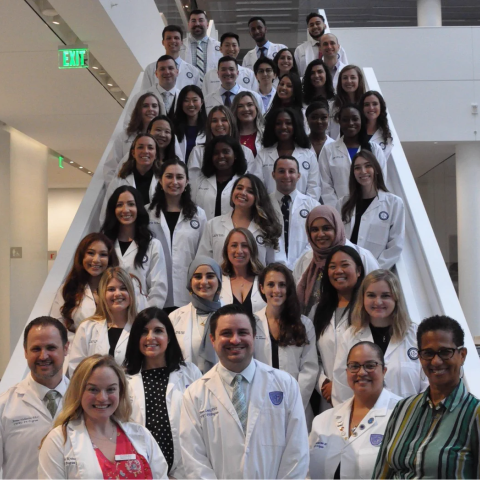The American Academy of Physician Assistants celebrates Physician Assistants (PA) during National PA Week, held October 6–12 each year, to recognize the contributions of PAs in providing quality patient care.
At the School of Medicine, we are proud to celebrate our PA students, faculty, staff and alumni for their significant impact in advancing the profession. As critical members of healthcare teams, PAs are trained clinicians who are essential to meeting the growing healthcare needs.
Ranked number one in the state of Ohio and number 27 in the U.S. by U.S. World News Reports—Case Western Reserve University School of Medicine PA program was founded in 2015 to expand the healthcare workforce needed to meet the needs of an aging population and a projected shortage of physicians. Poised to build upon a medical school with a strong reputation in curricular innovation and an already existing interprofessional infrastructure, the PA program at CWRU was created to train the next generation of PA clinicians.
Currently, PAs fill 25% of primary care needs, a need which is expected to increase as the population ages. PAs are trained to work in any discipline or specialty, with more than 40% of CWRU PA graduates selecting surgical specialties, including cardiac, cardiothoracic, general and transplant surgery. Graduates also go on to work as hospitalists and in ENT, women's health and emergency medicine. And a few graduates work for the National Health Corp, providing primary care to underserved communities.
Jennifer Capretta, administrative director for the CWRU PA program, shared that one of the program's many strengths is it is"very resource-rich," meaning that being part of a large medical school provides students the opportunity to learn from educators who are experts in their fields.
Another strength is the commitment to the community.
"We build community service into the curriculum," said Capretta. "This allows us to be good neighbors, exposes our students to patient populations they may not have had experience with and teaches students about the barriers to health."
The anatomical gift program and its generous donors allow students to learn anatomy through original dissection, and the Simulation Center provides hands-on learning.
Students at CWRU also have the opportunity to participate in research during an elective during the summer and or through Interprofessional Scholars Collaboration in Teaching and Learning.
The program's depth is also reflected in the number of students with diverse backgrounds and experiences. "We care deeply about fostering an environment where all feel welcomed and valued," said Capretta.


